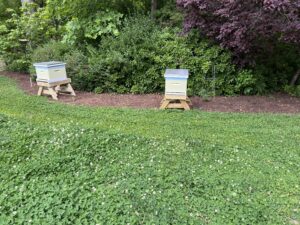
By Mary Reid Barrow
No Mow May no mo’ ?
That’s a question to ponder this month.
Is it really wise to let grass and assorted wildflowers in your yard grow for bees and other pollinators in May and then, in June, mow the grass and destroy the habitat that you created?
Folks in the know have begun to wonder about the value of No Mow May.
Environmentalist Kevin Du Bois is one who has been thinking about this recently. A new beekeeper and one of LRNow’s first Pearl Home owners, Kevin works as a marine biologist. He gave me an article from “The American Bee Journal” that questions No Mow May for many reasons, whether it is destroying habitat, sending pollinators elsewhere, encouraging non-native wildlife flowers to grow in the grass and more.
“I have adopted a hybrid approach,” Kevin said. “I regularly mow a perimeter in my back yard to get access to my shed and do other maintenance activities and then leave a big open un-mowed section of clover in the middle of the backyard for the bees and other pollinators.“
The clover had been growing there naturally and he just let it take over. See his photo above.
Kevin frequently sees his bees collecting pollen and nectar there, but he makes sure they have a full dinner table including fruit trees and native trees such as tulip magnolia and fringe, paw paw and dog wood trees. He also grows flowering shrubs including sweetspire, beauty berry and sweet pepper bush and flowerbeds of goldenrod, milkweed, marsh mallow, hibiscus, coreopsis, black eyed Susan and more.
“We are always looking for opportunities to cut down on our area of lawn grass,” he said, “and plant more natives for wildlife use, not just bees or pollinators.”
On the other hand, LRNow member Trista Imrich, owner of Wild Works of Whimsy and Southern Branch Nursery and native plant proponent, said she hasn’t heard much about No Mow May being problematic but it made sense to her.
“All the critters who may decide to take up residence would have quite the rude awakening when it comes time to mow…” Trista wrote. “You sometimes hear about bunny dens accidentally being mown, and I’m sure there are many more insects, amphibians and reptiles that may not even be seen!”
Trista has lush native flower beds across her front and around her back yard, but she always keeps a small area of lawn for her son and dog to run around in. She said also likes maintaining a little lawn “to provide a visual rest for the eyes.”
Karen Forget, LRNow’s director, said she had read that even if a no mow month were good for pollinators, that May was a month too late. With our warming weather, April is really the start of the blooming season in coastal Virginia.
Kevin sent a link to this video which puts the issue of No Mow May in a nutshell. The video suggests that instead of taking a break from mowing every May, work a little harder in May and each year turn a bit of your grass into a new permanent spot for native flowers for pollinators and other animals. The video is “May we plant more flowers: Rethinking ‘No Mow May” https://www.youtube.com/watch?v=1yHDDJAi1Do
I would love to hear what some of you out there think of the possibility of No Mow May no mo’.
